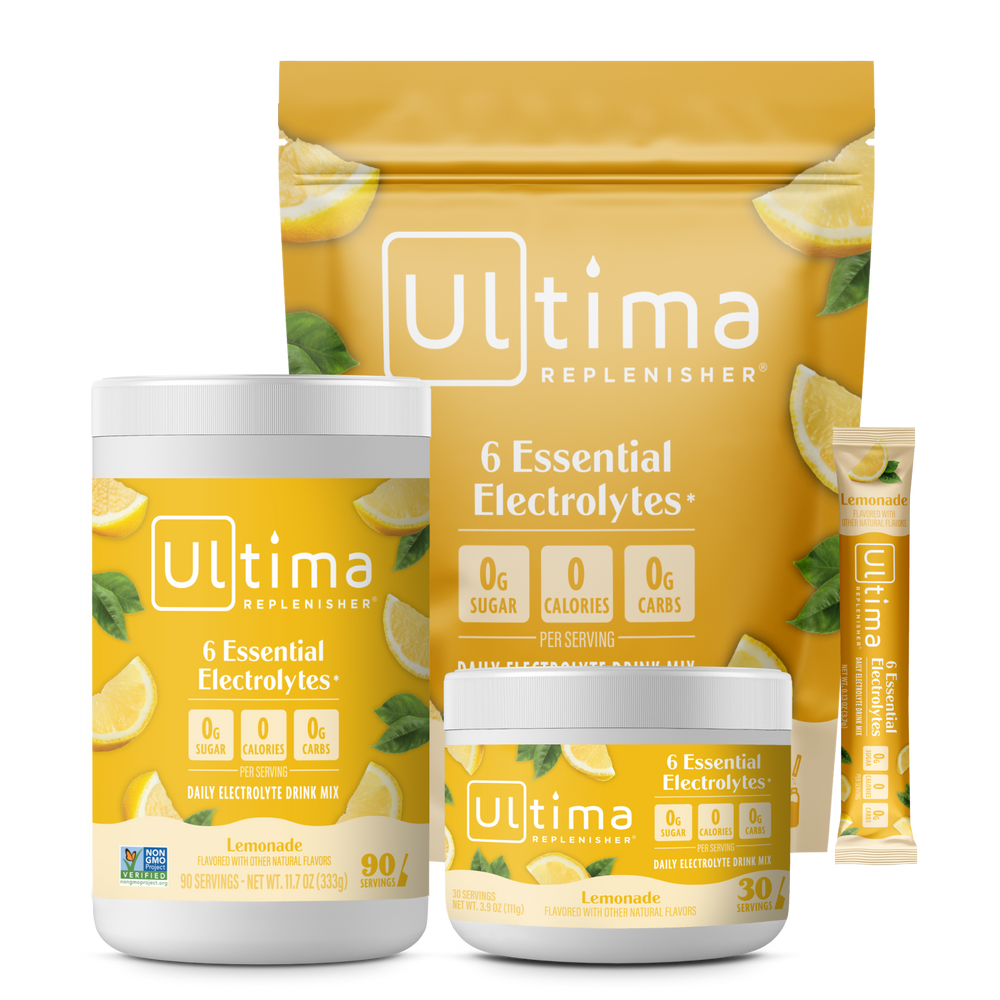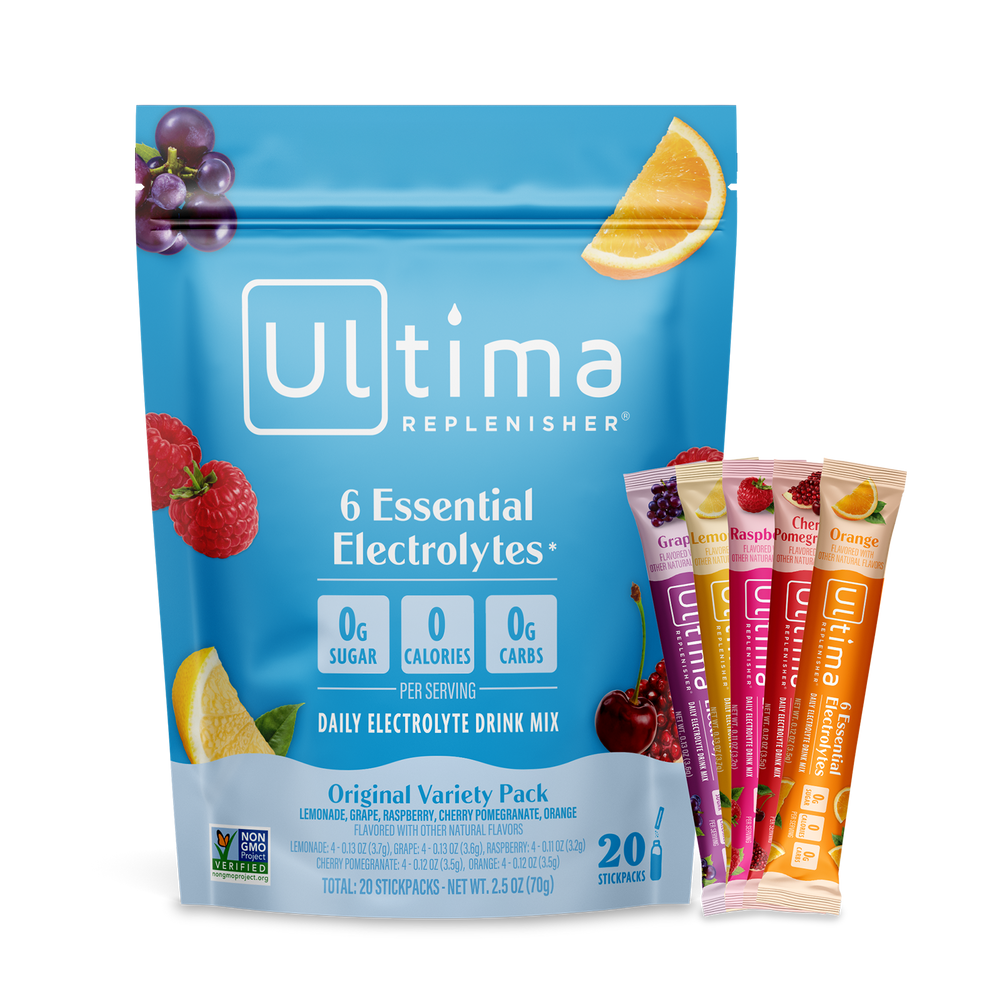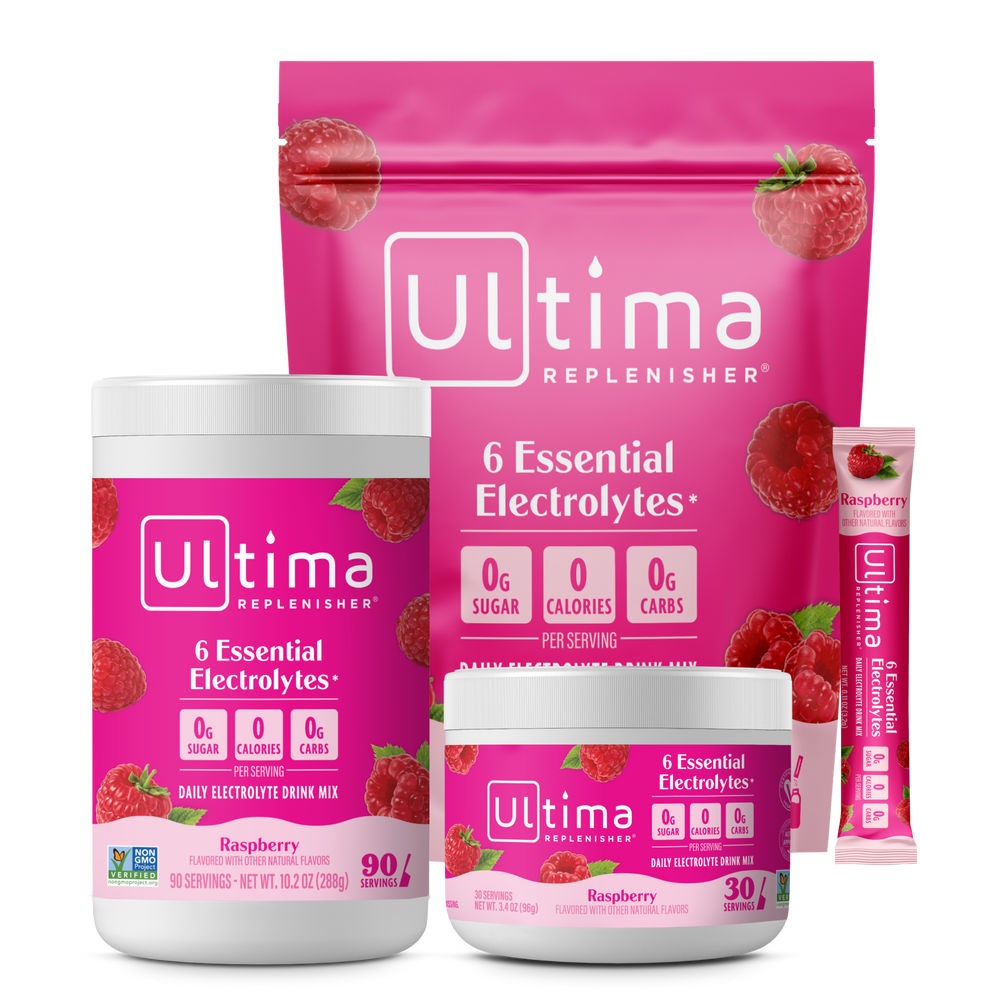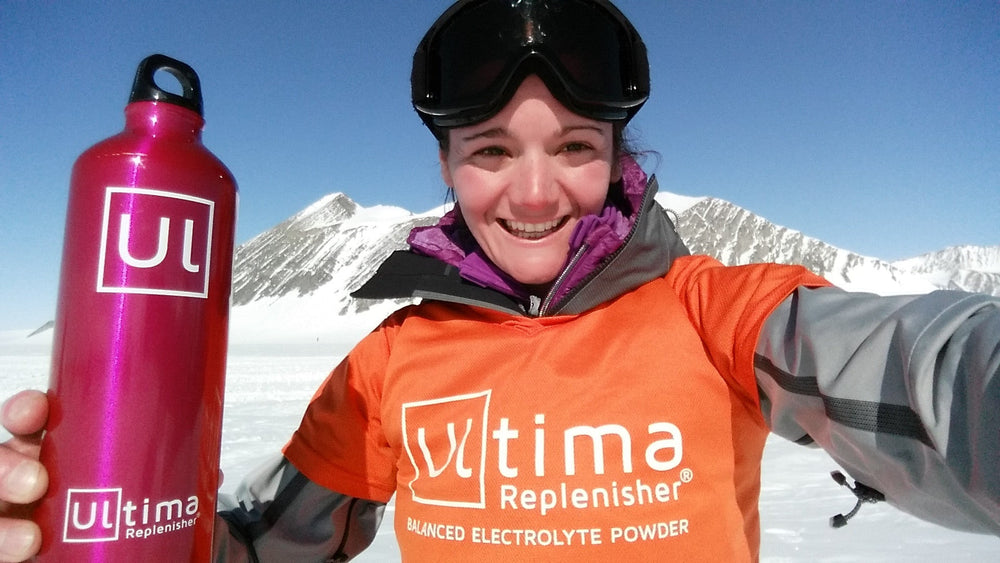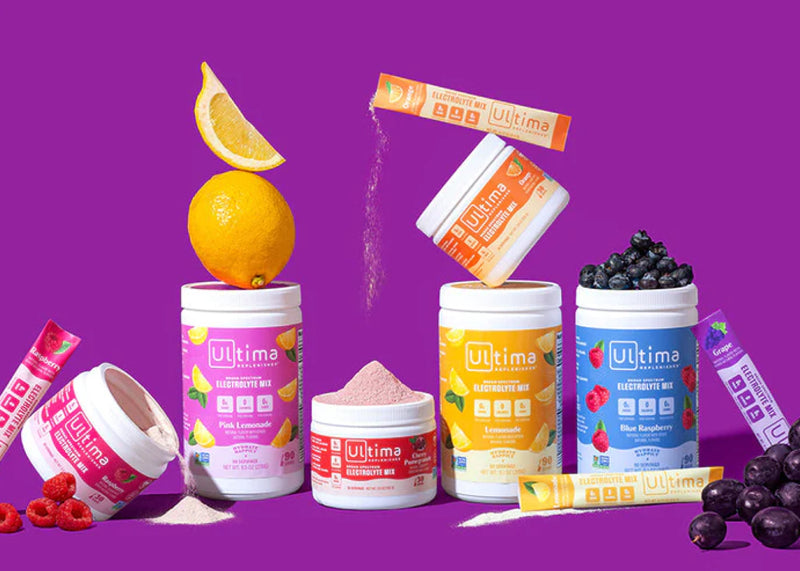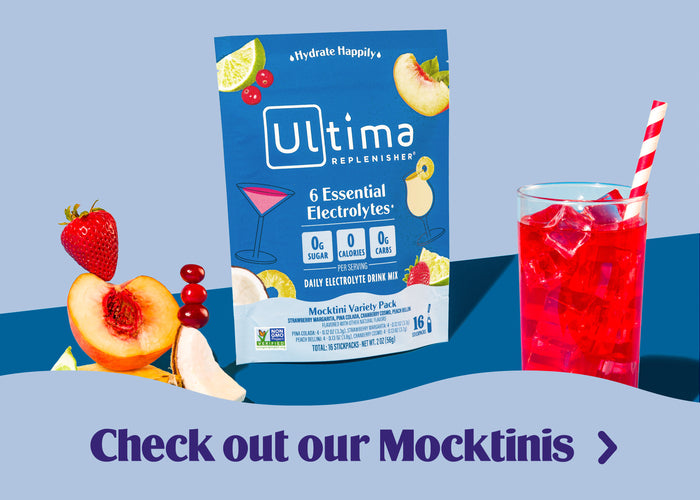
When it comes to hydration and electrolytes —like Batman and Robin or Bonny and Clyde, — they go hand in hand! When it’s hot out, when you’re active, or even when you’re not feeling well, electrolytes (aka minerals in your body) are easily depleted and you may not even know it! Electrolytes are found in healthy foods like fruits and veggies. Our body is made up of electrolytes that help to control such things as blood volume, oxygen utilization and muscle contractions. Optimal performance requires muscles contracting and relaxing without cramping and adequate nutrients in our system to enable this, electrolytes are the key to this.
Four of the main electrolytes our bodies need to function and that play important roles for our cells make up are: Sodium, Potassium, Calcium and Magnesium.
Did you know that sodium plays a key role in transporting nutrients into cells to be used for energy production? It is also vital for muscle contractions and nerve function. If your body is deficient in sodium it would be tough to get through that hot yoga class or early morning soccer practice. According to the USDA we, as Americans, tend to over-consume sodium by about 1,500 milligrams per day. (1) What this means is that if you are exercising up to 90 minutes per day, you may not need additional sodium or very little in your electrolyte beverage.

Potassium interacts with the sodium to control your fluid and electrolyte balance, while magnesium is in every single cell in your body (especially your bones, muscles and soft tissues) working to transmit impulses from each one of your nerves. Magnesium may be one of the more overlooked electrolytes as it is vital for heart rhythm, preventing muscle cramps, and maintaining healthy blood pressure. A deficiency of magnesium will likely impair performance, certainly how one feels.
Are you an athlete training for an upcoming event? Chances are your levels of exercise have depleted your body’s storage of magnesium so it’s crucial to replenish what you’ve lost. Calcium is also a very important electrolyte in your cell’s make up (and not just for your bones). Calcium assists with muscle contraction, nerve conduction and blood coagulation.

Needless to say all four of these key electrolytes are extremely important elements in your body that you certainly don’t want to deplete. But what happens when they do deplete? Here are a couple of ways our team has come up with to help protect you from depleting your electrolytes and one great way to replenish them when you do!
Practice in the Elements
Training for a summer half marathon? Make sure you are familiar with your conditions! Don’t just spend your time indoors on a track to beat the heat, because when race day comes your body will get extra dehydrated by not being used to the warmer non-air conditioned temps. Get outside and start training in the elements!
Keep Your Head Cool
If the hot sun is shining down all day, throw on your hat and consider putting a cold cloth on the back of your neck or rub ice cubes on your forehead to keep temperature levels down. The more you perspire, the more electrolytes you lose (even if you aren’t being super active. If it’s hot, you’re getting dehydrated).

Drink Ultima Replenisher!
It doesn’t matter where you are: yoga practice, race-course, holistic health center, out in the park, in the hospital, or on a soccer field, Ultima is here to work for you everywhere! Ultima’s formulation focuses on providing all of the electrolytes in a perfect balance and in usable ratios (and yes, Ultima products contain the four electrolytes we talked about earlier, plus four more minerals). Have a dietary restriction? No problem with Ultima! We’re vegan-friendly, non-GMO, soy-free, low in carb (great for Paleo diets), and gluten free! Plus our products have no sugar, artificial flavors or sweeteners so they are totally safe and can be enjoyed by all ages — from your three year old all the way to Grandpa.
(1)
http://health.gov/dietaryguidelines/dga2010/dietaryguidelines2010.pdf pp21-24
 When it comes to hydration and electrolytes —like Batman and Robin or Bonny and Clyde, — they go hand in hand! When it’s hot out, when you’re active, or even when you’re not feeling well, electrolytes (aka minerals in your body) are easily depleted and you may not even know it! Electrolytes are found in healthy foods like fruits and veggies. Our body is made up of electrolytes that help to control such things as blood volume, oxygen utilization and muscle contractions. Optimal performance requires muscles contracting and relaxing without cramping and adequate nutrients in our system to enable this, electrolytes are the key to this.
Four of the main electrolytes our bodies need to function and that play important roles for our cells make up are: Sodium, Potassium, Calcium and Magnesium.
Did you know that sodium plays a key role in transporting nutrients into cells to be used for energy production? It is also vital for muscle contractions and nerve function. If your body is deficient in sodium it would be tough to get through that hot yoga class or early morning soccer practice. According to the USDA we, as Americans, tend to over-consume sodium by about 1,500 milligrams per day. (1) What this means is that if you are exercising up to 90 minutes per day, you may not need additional sodium or very little in your electrolyte beverage.
When it comes to hydration and electrolytes —like Batman and Robin or Bonny and Clyde, — they go hand in hand! When it’s hot out, when you’re active, or even when you’re not feeling well, electrolytes (aka minerals in your body) are easily depleted and you may not even know it! Electrolytes are found in healthy foods like fruits and veggies. Our body is made up of electrolytes that help to control such things as blood volume, oxygen utilization and muscle contractions. Optimal performance requires muscles contracting and relaxing without cramping and adequate nutrients in our system to enable this, electrolytes are the key to this.
Four of the main electrolytes our bodies need to function and that play important roles for our cells make up are: Sodium, Potassium, Calcium and Magnesium.
Did you know that sodium plays a key role in transporting nutrients into cells to be used for energy production? It is also vital for muscle contractions and nerve function. If your body is deficient in sodium it would be tough to get through that hot yoga class or early morning soccer practice. According to the USDA we, as Americans, tend to over-consume sodium by about 1,500 milligrams per day. (1) What this means is that if you are exercising up to 90 minutes per day, you may not need additional sodium or very little in your electrolyte beverage.
 Potassium interacts with the sodium to control your fluid and electrolyte balance, while magnesium is in every single cell in your body (especially your bones, muscles and soft tissues) working to transmit impulses from each one of your nerves. Magnesium may be one of the more overlooked electrolytes as it is vital for heart rhythm, preventing muscle cramps, and maintaining healthy blood pressure. A deficiency of magnesium will likely impair performance, certainly how one feels.
Are you an athlete training for an upcoming event? Chances are your levels of exercise have depleted your body’s storage of magnesium so it’s crucial to replenish what you’ve lost. Calcium is also a very important electrolyte in your cell’s make up (and not just for your bones). Calcium assists with muscle contraction, nerve conduction and blood coagulation.
Potassium interacts with the sodium to control your fluid and electrolyte balance, while magnesium is in every single cell in your body (especially your bones, muscles and soft tissues) working to transmit impulses from each one of your nerves. Magnesium may be one of the more overlooked electrolytes as it is vital for heart rhythm, preventing muscle cramps, and maintaining healthy blood pressure. A deficiency of magnesium will likely impair performance, certainly how one feels.
Are you an athlete training for an upcoming event? Chances are your levels of exercise have depleted your body’s storage of magnesium so it’s crucial to replenish what you’ve lost. Calcium is also a very important electrolyte in your cell’s make up (and not just for your bones). Calcium assists with muscle contraction, nerve conduction and blood coagulation.
 Needless to say all four of these key electrolytes are extremely important elements in your body that you certainly don’t want to deplete. But what happens when they do deplete? Here are a couple of ways our team has come up with to help protect you from depleting your electrolytes and one great way to replenish them when you do!
Needless to say all four of these key electrolytes are extremely important elements in your body that you certainly don’t want to deplete. But what happens when they do deplete? Here are a couple of ways our team has come up with to help protect you from depleting your electrolytes and one great way to replenish them when you do!

